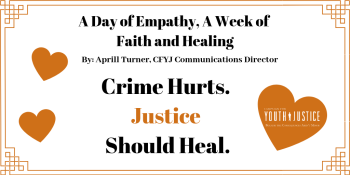A Day of Empathy, A Week of Faith and Healing

Today is National Day of Empathy and also Juvenile Justice Week of Faith and Healing (JJMWH) and is an opportunity to transform the paradigm of justice; moving from an over reliance on punishment, and taking a deeper look at how we can be a society that practices more empathy and redemption.
The Bible says in Isaiah 44:22; "I have swept away your offenses like a cloud, your sins like the morning mist. Return to me, for I have redeemed you.”
As a person of faith, and a criminal justice advocate, I often marvel at the fact that the United States is home to the largest prison population in the world. We are five percent of the world’s people, but 25 percent of the world’s incarcerated population. This is alarming, especially as it relates to our treatment of youth in the system.
We now know better. Research has shown us that investments in community programs and age-appropriate supports, not secure confinement, is what helps children get back on the right path. When we make smart investments—in education, employment, mental health, and family supports—our children do better.
America’s prison population is the highest in the world and is on track to remain that way. It is clear that today and all week, we are in need of a national conversation about crime and punishment is necessary, we have a penal system in need of radical reform.
This day and all this week brings together congregations of all faiths, schools and universities in prayer, service and action. The goal is to offer young offenders hope and alternatives to a lifetime as a hardened criminal by raising awareness and creating engagement with issues pertaining to juvenile justice.
How to Get Involved:
- Place a bulletin in your faith organization’s newsletter.
- Throughout the month of March discuss juvenile justice in your weekly faith service.
- Post a flyer in your place of worship.
- Host a candlelight vigil in your faith community in remembrance of youth in the justice system.
- Host a discussion after a faith service in your community about juvenile justice issues. Such topics could be sentencing laws, sending children into the adult court system, willful defiance or the classification process in the prison system that sends youthful offenders to higher level prisons than adults for the same crime.
- Support neighborhood groups that work to create cooperative relationships between neighbors, faith communities, and law enforcement to create a safe and secure community.
- Support or volunteer with programs that promote victim ministry in your place of worship.
- Support or volunteer with the ministry at your local detention center.
- Provide spiritual, material, or emotional assistance to those reentering society, both youth and adult. Schools and places of worship are encouraged to invite formerly incarcerated youth to share their experiences and insights about the juvenile justice system.

